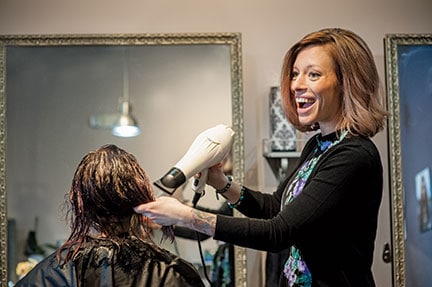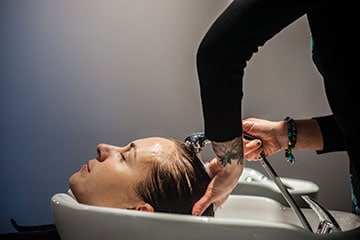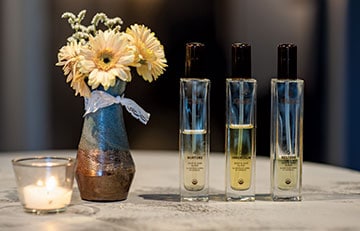THE ‘NO ‘POO’ MOVEMENT IS JUST ONE PART OF A TREND TOWARD NATURAL HAIR AND BEAUTY
STORY BY Abigail Green PHOTOGRAPHY BY André Chung
Sevi Kay has gorgeous chestnut curls, so it may come as a surprise to learn that she doesn’t shampoo her hair daily. Or even weekly. But the Maryland eco-beauty entrepreneur is part of a growing trend called “no  ‘poo” – as in sham-poo – in which women are shunning store-bought shampoos and chemical-laden hair products in favor of more natural options. Proponents include beauty editors at fashion magazines, celebrities like Jessica Simpson and quite possibly some of the friends and neighbors you encounter daily. Not surprisingly, many “no ‘poo” advocates are loathe to admit it. And for those of us raised on the lather, rinse, repeat mantra of shampoo commercials, who can blame them?
‘poo” – as in sham-poo – in which women are shunning store-bought shampoos and chemical-laden hair products in favor of more natural options. Proponents include beauty editors at fashion magazines, celebrities like Jessica Simpson and quite possibly some of the friends and neighbors you encounter daily. Not surprisingly, many “no ‘poo” advocates are loathe to admit it. And for those of us raised on the lather, rinse, repeat mantra of shampoo commercials, who can blame them?
Why would someone ditch her daily shampoo regimen? For some, dandruff or an itchy scalp drives the decision. For others, it’s an aversion to putting chemicals in their hair – and down the drain. And still others have discovered that scaling back on the shampoo leaves their hair looking and feeling better.
“I discovered ‘no ‘poo’ by chance,” says Kay. “I ran out of shampoo in the shower one day, so I used conditioner. My hair looked great. It wasn’t stripped – it was manageable but clean.” She Googled “washing hair with conditioner” and discovered “no ‘poo,” sometimes called “co-washing,” which refers to the practice of washing hair just with conditioner, or with a blend of shampoo and conditioner.
While some “no ‘poo” proponents keep their hair clean with a mixture of baking soda and apple cider vinegar, this may be too drying for the hair and scalp, cautions Kay, who launched her own line of eco-friendly, vegan hair and skin products called Eco Sevi, sold online and at organic salons in Maryland.
Excessive shampooing can lead to dry hair and even allergies, says Kathleen Lauer, who owns Inspire Salon  in Ellicott City, Howard County’s first organic salon. “Shampoos on the shelves in grocery stores are harsh, they’re strong,” she says. Daily shampooing “strips the moisture from your hair. The natural oils from your scalp are healthy.”
in Ellicott City, Howard County’s first organic salon. “Shampoos on the shelves in grocery stores are harsh, they’re strong,” she says. Daily shampooing “strips the moisture from your hair. The natural oils from your scalp are healthy.”
For clients who have thick hair or for “curly girls,” Lauer recommends shampooing only once a week. She counsels clients with thinner hair to limit washings to two or three times a week. The cleansing agent is as important as the frequency, adds Lauer, who worked for Aveda before opening her own salon. Inspire uses the Intelligent Nutrients and Kevin Murphy hair care lines – all organic, gluten-free products not tested on animals. These products, Lauer says, are derived from food-grade ingredients. “You can wash your vegetables with our shampoo.”
Lauer also points out the importance of healthy skin. “A lot of new studies are showing that your skin is considered your second lung,” she says. “Any product you use is absorbed into your skin.” She has found that many of her clients are sensitive to certain products and may react to such unnecessary ingredients as preservatives.
An itchy scalp may be the least of our concerns when it comes to commercial hair and beauty products, according to the Environmental Working Group (EWG), a national health research and advocacy organization. Most American women use about 12 personal care products a day, says EWG. And while we might assume the products we buy are safe, that may not be the case, says Nneka Leiba, deputy director of research for EWG. “The FDA regulates the cosmetics industry loosely. There are hazardous chemicals in a lot of personal care products on the market.”
 The ingredient DMDM hydantoin, which keeps products shelf-stable, is one of them. “We know that certain
The ingredient DMDM hydantoin, which keeps products shelf-stable, is one of them. “We know that certain
preservatives are formaldehyde-releasers,” says Leiba. “It’s a concern because formaldehyde is a known carcinogen.” Parabens – found in shampoo and other liquid-based products – are hormone disrupters, she points out, as are phthalates. “Because our hormones regulate so many of our bodily functions, anything that affects the hormones can affect these processes,” she explains. EWG recommends that consumers avoid ‘fragrance’ on the label. “The catch-all term can hide a whole slew of unnamed chemicals,” Leiba says.
While it all may seem complicated, no worries. The EWG makes it easy for consumers by ranking the safety and ingredients of more than 70,000 products on its Skindeep online database and app.
When it comes to cosmetics, younger consumers (aged 15-25) are concerned about animal testing, skin sensitivity and toxins, says Courtney Carpenter, MS, CNS, certified nutrition specialist for David’s Natural Market in Columbia. Women over age 25 are looking for a kinder, gentler approach to skin care, she observes. Often customers who shop at David’s have had a reaction to what Carpenter describes as “a big-brand commercial product,” so they look for a replacement product that will be more soothing to the skin.
It might come as a surprise to women that natural cosmetics may not be inherently safer. EWG may rank offerings from budget friendly brands like Burt’s Bees, Honeybee Gardens and others you might find in the aisles of David’s or Roots Market, as well as high end department store brands like Origins and Jane Iredale at different levels because ingredients in the product line can vary.
And as Leiba points out, there’s no definition of the term “natural.” Plenty of things that are natural don’t belong on your skin, she points out. Furthermore, natural doesn’t equate to safe – in both cosmetics and hair care products.
If you do decide to switch to more natural options or ditch your shampoo entirely, your new beauty regimen will probably take some getting used to. Strict “no ‘poo” adherents can expect a four-week adjustment period before unwashed hair stops looking greasy and starts to look good. Lauer suggests using coconut oil or jojoba oil on un-shampooed hair to keep the ends moisturized. She says her clients swear by a Kevin Murphy product called Fresh Hair, which acts similarly to a dry shampoo to freshen hair, remove excess oils and boost body between shampoos.
“For some people, it takes some getting used to,” says Lauer of limited shampooing. “But once they see how their hair has changed … it looks younger, shinier, healthier,” they’re usually convinced.*




